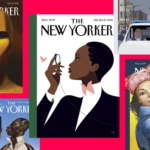
‘Wakanda Forever’ puts Black Women at the forefront of Marvel
In an unusual move for a superhero movie, Marvel is replacing two major male characters with Black women.
Passing the mantle from one character to another is common practice in Marvel comic books. Still, it’s just not done in big-budget, live-action adaptations. Movie audiences identify particular actors with these characters in a way they didn’t when comic books or cable shows were primary stages for their stories. There’s a lot more money riding on these projects, too, and with Black Panther: Wakanda Forever, Marvel risks angering rabid fans who sometimes balk at diversity and the idea of women playing with their toys.
“There’s Black Panther in the comics, the modern version, which is a combination of the work done by Reginald Hudlin, Christopher Priest and Ta-Nehisi Coates, and then Ryan’s interpretation,” said Cheo Hodari Coker, who worked with Marvel as the creator and showrunner on Luke Cage. “The Black Panther on film is bespoke to Chadwick. Recasting T’Challa would put them in a damned if you do, damned if you don’t situation.”
That may be why Black Panther director Ryan Coogler, Marvel Studios president Kevin Feige, and the rest of the brain trust believed writing T’Challa out of the Marvel Cinematic Universe was for the best. The beauty of the Black Panther title, both on film and in comics, is it passes from one person to another. The three names familiar to fans of the movies? T’Chaka, Eric Killmonger, and Shuri. But there have been many others.
Passing the superhero baton is a familiar concept within Marvel Comics. Miles Morales as Spider-Man and Sam Wilson as Captain America are the most obvious and possibly most successful examples. There’s also Kamala Khan (Ms. Marvel), Jane Foster (Thor), Monica Rambeau (Captain Marvel), and someone audiences will soon meet, Riri Williams, portrayed by Dominique Thorne in Black Panther: Wakanda Forever. When Tony Stark fell into a coma during a comic book storyline, Williams created her Iron Man armor by reverse engineering one of Stark’s models. A young Black woman became Marvel Comics’ new Iron Man and called herself Ironheart.
“Riri is very hip-hop to a certain extent,” said Coker. “Digital samplers were not meant to become instruments. But lack of music programs and lack of opportunities combined with getting these machines without the manuals, people just figured out how to make the machines do what they wanted to do and made a completely different art form out of it. Riri made a bespoke version of the Iron Man armor off the top of her head and went to technological places that [his rivals] were never able to get to. It goes well with that maverick spirit that the Tony Stark character always had.”
While Riri’s origins in Wakanda Forever might differ from those in the comics, her essence and genius are still present. The context in which she replaces Iron Man also varies, as Tony Stark was, and still is, the face of Marvel Studios. Robert Downey Jr.’s stamp on the Tony Stark brand reverberates in everything they do, and the character’s legacy looms more prominent in the cinematic universe than its comic book counterpart. The storyline in Spider-Man: Far from Home established that the Marvel Cinematic Universe’s regular citizens need and want a new Iron Man in the wake of his death, but Peter Parker refuses to step up. And if nature abhors anything, it’s a vacuum. Black Panther: Wakanda Forever presents the solution in the form of a 19-year-old Black woman from Chicago with none of Stark’s material advantages but all of his intellect and ingenuity. To say that’s a big deal is putting it mildly.
Marvel Studios built its empire on the Avengers movies, especially Iron Man, Captain America, and Thor, three square-jawed white men who fit Western conceptions of heroism that have been around since the days of Greek and Roman mythology. While Chris Hemsworth still portrays Thor, Chris Evans and Downey retired. Rather than go the obvious route and recast the characters, Marvel reimagined the roles through the eyes of a Black man and now a Black woman. Riri as Ironheart signifies another changing of the guard in how its heroes look, how they see the world, and their unique definition of heroism.
Stark needed a near-death experience to change his ways and be a hero. Riri is different because of the nature of her upbringing, resources, racism, and living in a patriarchal society. But she is also a Black woman living in a world in which Wakanda exists, where Black women are the backbone and an example of Black excellence. Fighting side by side with a female Black Panther only underscores that journey.
“Black women have finally been given the chance to show what they can do with a character and not have to shoulder all the various burdens,” said Coker. “In the Marvel universe, there are Black women who get the chance to be incredibly powerful superheroes. And they’re not ignoring the fact that they’re not just women, but Black women. They’re dealing with all the different things that come from being ‘the first’ and the movies don’t shy away from it. It’s not just that these roles are inhabited by some of our best Black actresses either, but now they’re given the chance to act and not just run with the ball and catch it. We’ll find out just how mature comic book fans are.”
Comic book fans, the ball is in your court.







